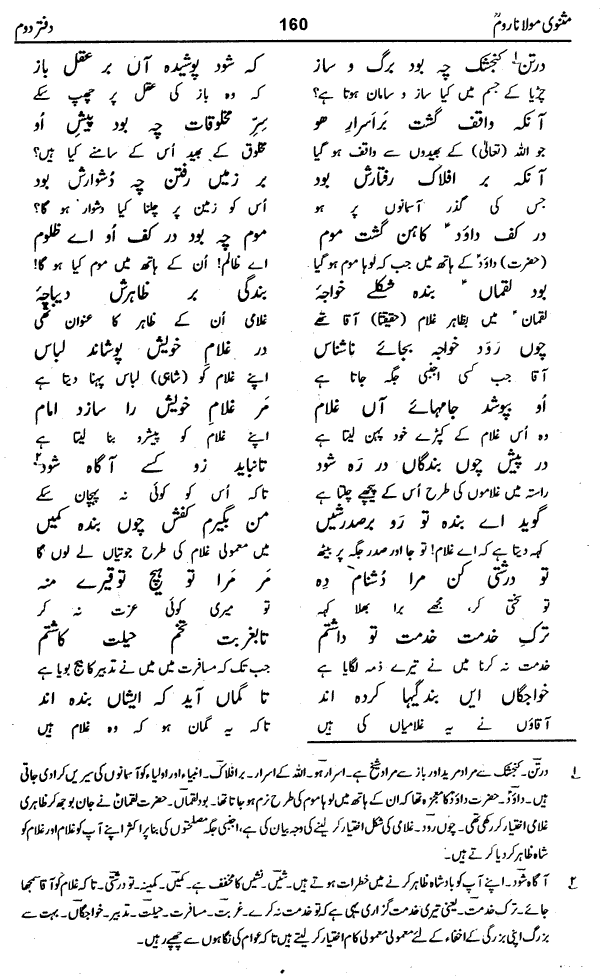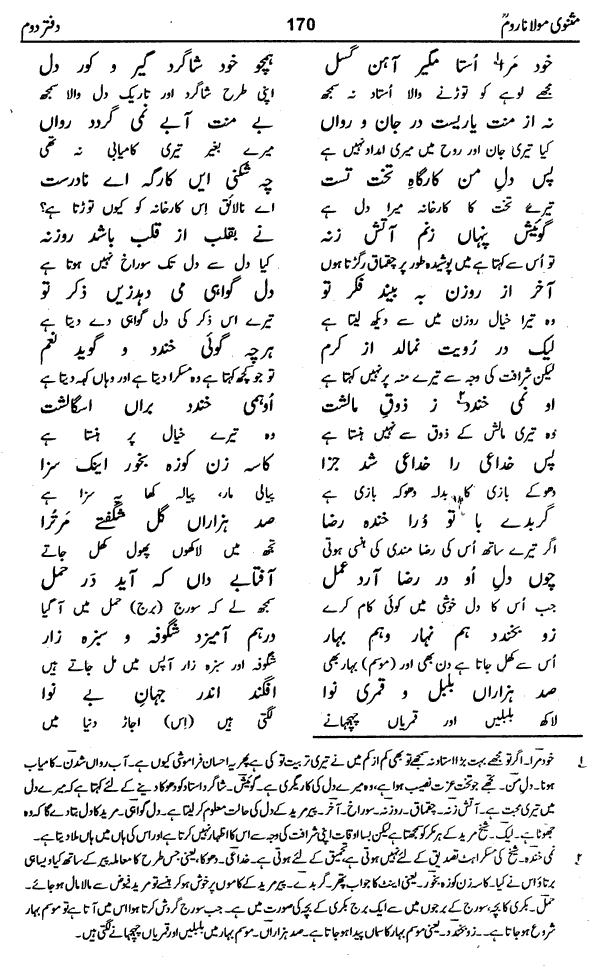How Luqmán's master tested his sagacity.
(Was it) not (the case) that (this happened) to Luqmán, who was a pure (unselfish) slave, and day and night was brisk in service?
His master used to prefer him (to all others) in the work (of service) and deem him better than his own sons, Because Luqmán, though he was slave-born, was the master (of himself) and was free from sensual desire.
I have two slaves, and they are vile, and those two are rulers and lords over you.”
Said the King, “What are those two? That is a mistake.” He replied, “The one is anger and the other is lust.” Regard as a king him that is unconcerned with kingship, him whose light shines forth without moon or sun.
(his own) existence possesses (real) existence.
Luqmán's master (was) like a master outwardly; in reality his (Luqmán's) master (was) Luqmán's slave. In the topsy-turvy world there is many a one of this (kind): a pearl is less than a straw in their sight.
Every desert has been named mafáza (place of safety): a name and specious form has ensnared their understanding.
In the case of one class of people, the dress makes (a man) known: (if he is dressed) in a qabá, they say that he belongs to the vulgar.
Light is needed, (a light) purged of cant and noxiousness, that he may know a man without (the evidence of) deed or word, And enter into his heart by way of the intellect, and behold his real state and not be confined to tradition.
The chosen servants of (God) the Knower of things unseen are, in the spiritual world, the spies on hearts.
He (such a one) enters within the heart like a fancy: the mystery of the (real) state is unveiled to him.
He who has become acquainted with the secrets of Hú (God), what to him is the secret (inmost consciousness) of created beings?
He whose walk is on the spheres, how should it be hard for him to walk on the earth?
Since iron became wax in the hand of David, what should wax be in his hand, O man of iniquity?
Luqmán was a slave in appearance, a master (in reality): servitude was (only) a frontispiece on his outside.
He goes behind him on the road, as slaves do, lest any one should recognise him (as the master).
“O slave,” says he, “go you and sit in the place of honour: I will take (your) shoes, like the meanest slave. Treat (me) roughly and revile me; do not bestow any respect on me.
Masters have performed these slavish offices in order that it might be thought that they were slaves.
They saw their fill of masterdom and were sated (with it): (hence) they have made ready for (doing) the work (of slaves). On the contrary, these slaves of sensuality have represented themselves as masters of intellect and spirit.
From the master (the spiritual man) comes the practice of self-abasement; from the slave (the sensual man) comes naught but slavishness.
That traveller (Luqmán's master) knew the secret, (but) quietly pursued his way for the sake of the good (which he had in view).
He would have set him free at the first, but he sought to content (comply with the wish of) Luqmán,
Because it was Luqmán's desire (to remain a slave), in order that none might know the secret of that brave and generous youth.
Hide your work from your own eyes, that your work may be safe from the evil eye.
Yield yourself up to the snare of the (Divine) reward, and then, (being) beside yourself, steal something from yourself. They give opium to the wounded man, in order that they may extract the point (of a spear or arrow) from his body.
At the hour of death he is torn with pain; he becomes preoccupied with that, and (meanwhile) his spirit (life) is taken away.
(And inasmuch as) whatsoever you may cogitate and (whatsoever) acquisition you may make, the thief will enter from the side where you feel safe,
Become occupied, therefore, with that which is better, in order that the thief may take away from you something that is less (in worth).
When the trader's bales fall into the water, he lays his hands upon the better merchandise.
Since something will (certainly) be lost in the water, take leave of the less (worse) and gain (possession of) the better.
How the excellence and sagacity of Luqmán became manifest to those who made trial (of him).
He would eat his remnants and be enraptured: any food that he (Luqmán) did not taste, he (the master) would throw away; Or if he ate (of it), (’twould be) without heart and without appetite: this is (the sign of) an affinity without end.
They had brought a melon as a present. “Go,” said he, “call (hither) my son, Luqmán.”
On account of the pleasure with which he ate (it), he gave him a second (slice), (and went on) till the slices (given him)
reached the seventeenth.
One slice remained. He said, “I will eat this (myself), so that I may see what a sweet melon this is.
He (Luqmán) eats it with such pleasure that from his delight (all) natures have become eager and craving the morsel.” As soon as he (the master) ate it, by its sourness there was kindled fire (which) blistered his tongue and burnt his throat.
How did you make all this poison an antidote? How did you deem this cruelty to be kindness?
What patience is this? For what reason is this great fortitude? Or, perchance, in your opinion this life of yours is an enemy
(which you would fain destroy).
Why did not you cunningly bring (forward) a plea, saying, ‘I have an excuse (for declining to eat): desist for a while’.” Luqmán said, “From your munificent hand I have eaten so much that I am (bent) double with shame.
If I make outcry and complaint because of one bitter thing, may the dust of a hundred roads be on (all) parts of me!
It (the melon) had the enjoyment of your sugar-bestowing hand: how could it (such enjoyment) leave any bitterness in this melon?”
By love bitter things become sweet; by love pieces of copper become golden;
This love, moreover, is the result of knowledge: who (ever) sat in foolishness on such a throne?
On what occasion did deficient knowledge give birth to this love? Deficient (knowledge) gives birth to love, but (only love) for that which is (really) lifeless.
When it sees in a lifeless being the colour (appearance) of a desired one, (it is as though) it heard the voice of a beloved in a whistle.
When the Prophet called the “deficient” (man) accursed, (his meaning) as interpreted was “deficiency of mind,”
Because one whose body is deficient is the object of (Divine) mercy: cursing and repulse (directed) against the object of
(Divine) mercy are improper.
It is deficiency of mind that is the bad disease: it is the cause of (God's) curse and merits banishment (from His presence), Forasmuch as the perfecting of minds is not remote (impossible), but the perfecting of the body is not within our power.
Relief for bodily deficiency has come in the (words of the) Qur’án—it is no crime in the blind man.
Lightning is transient and very faithless: without clearness (of mind) you will not know the transient from the permanent. The lightning laughs: say, at whom is it laughing? At him that sets his heart upon its light.
The lights of the sky are hamstrung (feeble and imperfect): how are they like (that Light which is) neither of the east nor of the west?
To ride (your) horse upon the foam of the sea, to read a letter in a flash of lightning,
Is, to fail, because of covetousness, to see the end; it is, to laugh at your own mind and intellect.
Intellect, by its proper nature, is a seer of the end (consequence); It is the fleshly soul that does not see the end.
The intellect that is vanquished by the flesh becomes the flesh: Jupiter is checkmated by Saturn and becomes inauspicious.
He (God) continually turns you from one state (of feeling) to another, manifesting opposite by means of opposite in the change,
For the purpose that fear of the left hand side may bring to birth in you the delight of “the (blessed) men are led to hope for the right hand side,”
So that you may have two wings (fear and hope); for the bird that has (only) one wing is unable to fly, O excellent (reader).
But if you willest neither this nor that, It is yours to command: how should any one know what you intendest?
One must needs have the spirit of Abraham to see in the fire Paradise and its palaces by the light (of mystic knowledge); And mount step by step above the moon and the sun, lest he remain like the door-ring fastened on the door;
And, like the Friend, pass beyond the Seventh Heaven, saying, “I love not them that set.”














No comments:
Post a Comment